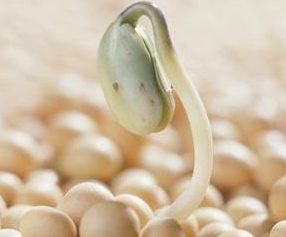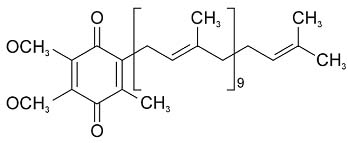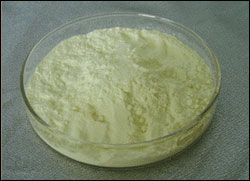| 10%~40% Isoflavones -HPLC | |||||||||||||||||||||||||||||||||||
|
Soybean
Description:
Soy has been suggested for many conditions including high cholesterol, cardiovascular health, menopausal symptoms, and diarrhea. It is also used in some infant formulas. Soy may have similar effects to the hormone estrogen. The amount of soy found in foods is generally considered safe, although allergic reactions have been reported.
Claims:
Safety:
Avoid if allergic to soy. Breathing problems and rash may occur in sensitive people. Soy, as a part of the regular diet, is traditionally considered to be safe during pregnancy and breastfeeding, but there is limited scientific data. The effects of high doses of soy or soy isoflavones in humans are not clear, and therefore are not recommended. There has been a case report of vitamin D deficiency rickets in an infant nursed with soybean milk (not specifically designed for infants). People who experience intestinal irritation (colitis) from cow's milk may experience intestinal damage or diarrhea from soy. It is not known if soy or soy isoflavones share the same side effects as estrogens, like increased risk of blood clots. The use of soy is often discouraged in patients with hormone-sensitive cancers, such as breast, ovarian or uterine cancer. Other hormone-sensitive conditions such as endometriosis may also be worsened. Patients taking blood-thinning drugs like warfarin should check with a doctor and pharmacist before taking soy supplementation.
Possible side effects:
Possible interactions:
Soy contains "phytoestrogens" (plant-based compounds with weak estrogen-like properties) like isoflavones. In laboratory studies, it is not clear if isoflavones stimulate or block the effects of estrogen, or both. Researchers do not know if soy or soy isoflavone supplements increases or decreases the effects of estrogen on the body, such as the risk of blood clots. It is unclear if taking soy alters the effectiveness of birth control pills containing estrogen. Researchers do not know what the effects of soy phytoestrogens are on the anti-tumor effects of selective estrogen receptor modulators (SERMs) like tamoxifen. The effects of aromatase inhibitors like anastrozole, exemestane or letrozole may be reduced. Soy protein may interact with blood-thinning drugs like warfarin. Avoid with herbs or supplements with similar effects. The effects of soy protein or flour on iron absorption are not clear. People using iron supplements or soy products should consult a qualified healthcare practitioner to follow blood iron levels. Some experts believe that there may be a potential interaction between soy extract and Panax ginseng, but this possible interaction has not been well-studied.
Dosing:
Adults (18 years and older):
Isoflavone content has ranged from 60-90 milligrams daily.
|
|||||||||||||||||||||||||||||||||||
Introduction
More Products





